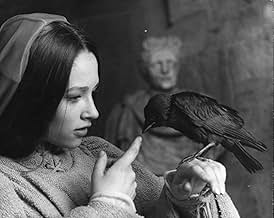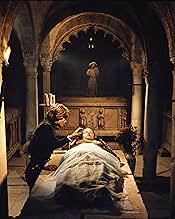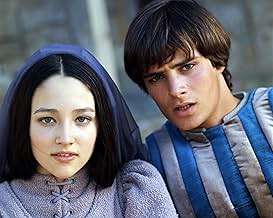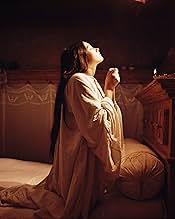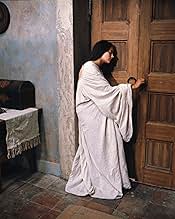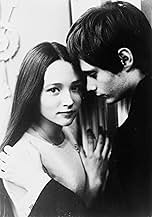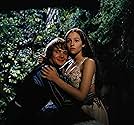Un amor prohibido surge entre dos jóvenes miembros de familias enfrentadas.Un amor prohibido surge entre dos jóvenes miembros de familias enfrentadas.Un amor prohibido surge entre dos jóvenes miembros de familias enfrentadas.
- Dirección
- Guionistas
- Elenco
- Ganó 2 premios Óscar
- 16 premios ganados y 16 nominaciones en total
Opiniones destacadas
There were not many directors like Zeffirelli around during those golden years -sixties and seventies -of the Italian cinema.Because he was not part of the champagne socialists,because he made movies completely devoid of social concerns,he was generally dismissed by the European critics (and his fellow colleagues) as non-hip and reactionary. When you see these movies today,you realize how much they have worn well,and how much his detractors were wrong:Zeffirelli has never tried to change the world,but he has given beautiful movies which have stood the test of time quite well,perhaps because they are timeless.Even an epic and absorbing -and diametrically opposite to Zeffirelli's cinema - political work like Bertolucci's "Novecento" (1976) displays cheesy gauchism so trendy before the eighties in Europa .
This is the second of the three Zeffirelli screen adaptations of Shakespeare -as a matter of interest,the others are "taming of the shrew"(1967 with E Taylor and R Burton) and "Hamlet" (1990 with M.Gibson and G.Close)-and it 's probably the best:Zeffirelli's genius was to cast actors (about) the age of the heroes as the leads.And Leonard Whiting and Olivia Hussey,both very beautiful,make up for their lack of experience with their youth,their innocence and the intensity of their looks.They are far better than Leonardo Di Caprio and Claire Danes in the drag queens cum west side story Luhrmann's 1996 version.Besides they get strong support from dark-haired Mickael York as Tybalt and John MCEnnery as Mercutio.The colors are,as always in a Zephirelli movie (see taming,and his made-for-TV Jesus)dazzling.Two scenes stand out:the ball and the lovers death in the Capulet tomb.
Filmed on location in Verona,we never have the feeling that we are watching filmed stage production,not a small feat.This is the definitive screen version of the Elizabethan classic.Sir Laurence Olivier is the narrator.
This is the second of the three Zeffirelli screen adaptations of Shakespeare -as a matter of interest,the others are "taming of the shrew"(1967 with E Taylor and R Burton) and "Hamlet" (1990 with M.Gibson and G.Close)-and it 's probably the best:Zeffirelli's genius was to cast actors (about) the age of the heroes as the leads.And Leonard Whiting and Olivia Hussey,both very beautiful,make up for their lack of experience with their youth,their innocence and the intensity of their looks.They are far better than Leonardo Di Caprio and Claire Danes in the drag queens cum west side story Luhrmann's 1996 version.Besides they get strong support from dark-haired Mickael York as Tybalt and John MCEnnery as Mercutio.The colors are,as always in a Zephirelli movie (see taming,and his made-for-TV Jesus)dazzling.Two scenes stand out:the ball and the lovers death in the Capulet tomb.
Filmed on location in Verona,we never have the feeling that we are watching filmed stage production,not a small feat.This is the definitive screen version of the Elizabethan classic.Sir Laurence Olivier is the narrator.
Truly one of the best films ever created of Shakespeare's plays. While in today's MTV - short attention span world this film may seem boring, in 1968 this film was revolutionary (I am not prejudice since I am in the MTV generation). Until this time R&J had been played by much older actors, since it was assumed they could understand Shakespeare's language. In 1968, Franco Z. gives us actors the actual age of Shakespeare's lead characters and they can act. Add to that stunning sets, costumes and music, the result is a moving artistic creation. The performances are superb, my personal favorites being Michael York's Tybalt and Milo O'Shea's the Friar. The language can be difficult and the action plotting, but one has to have patience when devoting attention to Shakespeare's plays, acted or read. Enjoy!
10Jaylin
Words cannot express how much I love "Romeo and Juliet". This is my favorite movie, my one and only cult movie, and by far the most beautiful I've ever seen. I wish I had already been born in 1968 to be able to see it in a theater! I happened to watch it on TV for the first time in 1986 as a little girl, and I just thought that Leonard Whiting and Olivia Hussey were the most gorgeous people and the best-matched couple ever. Then I saw it a second time about ten years later, and was so impressed by it that I found it hard to sleep that night, and quickly became obsessed with it. It overwhelmed me in indescribable ways, and still does so today. In fact, whenever I watch this movie, it haunts me for weeks, and never fails to make me feel like crying in the end. It's a bit weird, really. I can't get enough of it, yet I don't want to watch it too often, because it moves me so deeply... There's definitely something about it that makes it very special. As a matter of fact, it's the only movie that brings me joy and sadness at the same time. Firstly, this is the definitive version of Shakespeare's play. Forget Norma Shearer and Leslie Howard, this is the real stuff, this is how it was meant to be, bursting with life and passion! Everything seems perfect in it: the sets, the colors and the lavish costumes, the music (there's so much to say about Nino Rota's exceptional score alone!), and the cast of course (not only do we have incredibly realistic and top-notch performances by the two lead actors, but the rest of the cast, including Michael York, Milo O'Shea and John McEnery, is also very good). The extraordinary thing about Leonard and Olivia is that they looked just the way one would imagine Romeo and Juliet, pure, sweet and innocent. Whenever I hear talking about Romeo and Juliet, I can't help thinking about them both. Another extraordinary thing is that Zeffirelli had another actress in mind (with blonde hair!) before he finally chose Olivia after a second test. Neither Olivia nor Leonard were experienced actors, yet they delivered stunning performances. They didn't know each other before filming, but it turned out they had wonderful chemistry on-screen, and definitely set the standard as the perfect Romeo and Juliet. I was not surprised to learn that Leonard fell in love with his co-star during the shooting of the movie. I mean, who could blame him? Nino Rota was a very talented film music composer, but he had never written such a beautiful score beforehand. He was extraordinarily inspired when he wrote this one. Considering all these elements, I think this movie is nothing short of a miracle. Granted, it's an old movie. You can see it was shot in 1968. So what? This doesn't prevent it from being very emotionally powerful. I don't think Zeffirelli could have given a more romantic and poignant rendition of this mythical love story. He filmed the two leading actors with grace and sensitivity, and love has never been better indeed. Besides, I think he perfectly captured the quintessence of the play. What else can I say? I love this movie with all my heart. To me it's a jewel, a work of art. And it has its own universe... it's just mesmerizing.
Zefferelli is a sporadic master. Here he is in his prime. See how he understands how to direct groups, how to continue a motion from one frame to the next, how to use color to punctuate.
What has happened here is that he has hit on a formula that works toward the problem of moving Shakespeare (a verbal, intellectual event) into film (a matter of motion and image).
It works because the play can be cast largely in terms of crowds, sometimes mobs. Never have I seen this done so well.
Much of the verbal poetry is cut, and image poetry replaced in sufficient measure to satisfy. Mercutio is rightly seen as the heart of the play, balanced by the Nurse. Both are terrific.
Oh how I wish we could combine the cinematic skills of young Zefferelli with the Shakespearian insights of Branagh and the imagination of Greenaway to do, say a Lear. Bliss in the imagining.
What has happened here is that he has hit on a formula that works toward the problem of moving Shakespeare (a verbal, intellectual event) into film (a matter of motion and image).
It works because the play can be cast largely in terms of crowds, sometimes mobs. Never have I seen this done so well.
Much of the verbal poetry is cut, and image poetry replaced in sufficient measure to satisfy. Mercutio is rightly seen as the heart of the play, balanced by the Nurse. Both are terrific.
Oh how I wish we could combine the cinematic skills of young Zefferelli with the Shakespearian insights of Branagh and the imagination of Greenaway to do, say a Lear. Bliss in the imagining.
To my way of thinking, this film should be considered when people discuss the greatest movies of all time. Every scene, practically every frame of this movie is brilliant. Director Zeffirelli went against the ancient practice of using older actors in the title roles, and the performances he elicits from teenagers Whiting and Hussey is amazing. Although he trims the dialog heavily in places (Romeo says, "But soft, what light through yonder window breaks?"- and leaves it at that) his version captures all the passion of Shakespeare's play magnificently.
The scenes at the Capulet's ball at which the two young lovers meet are about the greatest I've ever seen on screen. The famous balcony scene avoids cliches altogether and makes others pale by comparison. The Queen Mab speech, the fight, and the scene in the tomb are all exquisite highlights of this film. Even the dubbing for the Italian actor's voices and of the crowd noise is superior. It is amazing to me that an Italian could be so sensitively in tune with one of the English language's most sublime works.
Zeffirelli wanted to make a movie that spoke to youth and he succeeded, to put it very mildly. If school systems were smart, they'd pack up their freshmen and sophomores on buses every year, drive them to a local theatre and show them this movie. I can't think of a better investment in young people's education that could be made. It worked for me.
The scenes at the Capulet's ball at which the two young lovers meet are about the greatest I've ever seen on screen. The famous balcony scene avoids cliches altogether and makes others pale by comparison. The Queen Mab speech, the fight, and the scene in the tomb are all exquisite highlights of this film. Even the dubbing for the Italian actor's voices and of the crowd noise is superior. It is amazing to me that an Italian could be so sensitively in tune with one of the English language's most sublime works.
Zeffirelli wanted to make a movie that spoke to youth and he succeeded, to put it very mildly. If school systems were smart, they'd pack up their freshmen and sophomores on buses every year, drive them to a local theatre and show them this movie. I can't think of a better investment in young people's education that could be made. It worked for me.
¿Sabías que…?
- TriviaSir Laurence Olivier agreed to play the uncredited role of the narrator, because he was so impressed with Zeffirelli's work for the National Theatre of Great Britain, of which Olivier was director at the time. Not only was Olivier the narrator, but as Franco Zeffirelli has also confirmed, he dubbed Antonio Pierfederici's voice (due to the actor's heavy Italian accent) as well as lending his voice to other anonymous characters. He did it all for the love of William Shakespeare, and didn't accept any payment.
- ErroresWhen Romeo and Juliet's bodies are laid out in front of the ruler, Romeo takes a deep breath.
- Versiones alternativasIn the film's original release, and on DVD, the "End Titles" music continues playing on a black screen after the closing credits have ended, much as "Exit Music" used to do in roadshow releases of films. As currently (2009) shown on cable TV, however, there is an edit on the soundtrack (not on the picture) during the closing credits, so that the music ends exactly at the same time that the visual portion of the film does.
- ConexionesEdited into The Kid Stays in the Picture (2002)
Selecciones populares
Inicia sesión para calificar y agrega a la lista de videos para obtener recomendaciones personalizadas
- How long is Romeo and Juliet?Con tecnología de Alexa
Detalles
- Fecha de lanzamiento
- Países de origen
- Idiomas
- También se conoce como
- Romeo and Juliet
- Locaciones de filmación
- Pienza, Siena, Tuscany, Italia(Piazza Pio II: some shots of the street brawl)
- Productoras
- Ver más créditos de la compañía en IMDbPro
Taquilla
- Presupuesto
- USD 850,000 (estimado)
- Total a nivel mundial
- USD 6,292
- Tiempo de ejecución2 horas 18 minutos
- Mezcla de sonido
- Relación de aspecto
- 1.85 : 1
Contribuir a esta página
Sugiere una edición o agrega el contenido que falta

Principales brechas de datos
What is the streaming release date of Romeo y Julieta (1968) in Canada?
Responda

